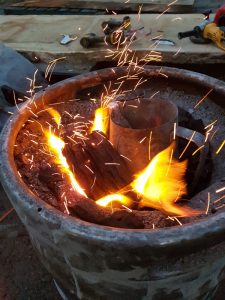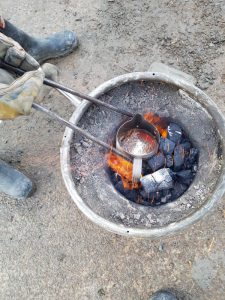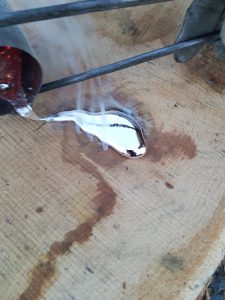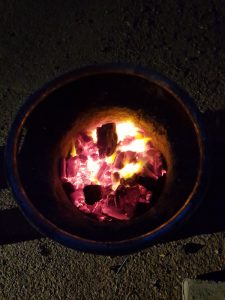
Since I first discovered it – many years ago – I have loved the game of Civilisation. I was introduced to version 1 of the computer game by a work colleague, and since then have played various variants of both the computer and the board game. Of course there are all kinds of opinions about which is best, which I don’t propose to go into. But one of the key features was the technology tree – the very very long series of inventions and ideas you pursued in order to build new stuff and so develop your culture.
Now, one of the very early developments was Bronze Working (which allowed specific kinds of military units and civic wonders). This was a prerequisite for Iron Working and – after a very long time – Metallurgy.

So, what has this to do with today’s blog? Well, yesterday, as a small part of a sizeable remodel of The Good Sport bar, we had cause to do some invention ourselves. We weren’t working with Bronze or Iron, but rather Aluminium. Now, a purist will perhaps object that Aluminium is not on the Civ tech tree – at least, not any of the variants I have played – which is true. And also that we were not starting from bauxite or any other naturally occurring raw material, but rather from some handy spare aluminium sheets that were lying around. All that is true: nevertheless we did have to melt said stuff and refashion it for our own purposes.
Now, aluminium melts at just over 660° C, which is well above the temperature of a domestic oven, or camp fire. So our solution was an old beer keg, lined with cement to retain heat and equipped with an air inlet to one side. Inside was a charcoal fire, and a handy air compressor pushed air in through the tube to keep the charcoal burning fiercely. Aluminium was cut into small strips and put in a steel jug – steel having a much higher melting point. And then we waited, entirely unsure whether the whole thing was doomed to failure.

But as you can see, it all worked! Slowly but surely the aluminium melted into the rather fine puddle that you see in this picture. It would be nice to say that we had been totally confident in all this, but not so – we were as amazed as anyone when this happened. We felt, just for a few moments, like real discoverers. Yes, all the technical data about melting points is easy to obtain these days, and yes we had those handy aluminium sheets as starting point, but even so the sense of triumph when it turned into liquid was extraordinary!

So what did we do with our liquid aluminium? Well, here it is being poured into a surface hole in a piece of wood. Why that destination? Well, that will all become clear – hopefully – over the next few weeks.
Meanwhile, this all set me thinking about metallurgy in general, and how it has affected human society. Of course Civilisation focuses on just a few things – military units that can now be built, particular buildings that facilitate further development, and “wonders” which enhance your prowess (ie score) and make your people happier. But in reality, metal working permeates every aspect of life.
We take it for granted now that a household object is made of whatever material is most suitable – metal, ceramic, fabric or whatever. We have whole fields of study concerning the various properties of these materials, such as their hardness, ability to transmit or suppress noise, colour, safety, electrical conductivity, and so on. But starting way back in the mists of time, and carrying on through all of our history until now, people have had to find these things out by trial and error. What were the properties of those shiny veins in rock layers? Why could I shape one metal easily and not another? Would my camp fire soften them? How must I change my camp fire so I can work with the more intransigent metals? How can my sword edge be sharper, or my armour tougher, or the wheels on my vehicle stronger? In a very small way, we felt something of the same exhilaration that our hugely distant ancestors must have felt, seeing copper melt for the first time, and be shaped into something new – something distinctly human.

Looking ahead into the future, we generally assume that we will carry the ability to fashion metals (and other useful substances) with us wherever we go. But every so often you get stories where someone is stranded and has to build it up again. This was an especially popular theme in the 1930s and thereabouts – Spacehounds of IPC being a classic example. Our Hero, forced by circumstance onto an uninhabited moon (with breathable atmosphere) has to start from next to nothing except a small tool pack, and build his way up through small camp fires to blast furnaces and ultimately the ability to recharge the power banks on his derelict lifeboat. Until yesterday, I was totally sceptical about this storyline… but having turned an old keg, some charcoal, and a handy air compressor into something that could melt aluminium, I became slightly more convinced!
More of this another time: for now here is a final picture of the “forge” as it died down in the late evening. You can easily imagine us around it, feeling foolishly triumphant…


That is really impressive. It is so easy to dismiss so-called “primitive” technologies, until you actually think about the cleverness and skill they require. The loss of certain ancient technologies, like Roman concrete, is a reminder that history is not some uphill climb of “progress,” but a bunch of clever people doing the best we can, over and over again.